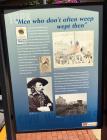Inscription
Prelude to Gettysburg
(Front):Faced with the impossible task of defending an essentially unarmed city against the six thousand battle hardened troops of General Jubal Early, the citizens of York met with the Confederates and negotiated surrender, in and act which was controversial then and remains so today. On June 28th, Confederate General John Brown Gordon' brigade (whose soldiers said their commander's oratory could make them "storm hell" and "put fight into a whipped chicken,") lowered the town's Union flag. Cassandra Small, the 34 year old daughter of a prominent York businessman, wrote in a letter concerning the town's occupation that "men who don't often weep wept then."
York the town that had once served as the de facto capital of the nation during the American Revolutionary War, was not the prize of the Confederacy. Elsewhere in York County, Confederate troops led by General J.E.B. Stuart encountered Union forces at Hanover. General George Armstrong Custer, the "boy general," helped stop the Confederate advance there and delayed four thousand troops headed for Gettysburg, a force some think could have changed the outcome of the battle, and perhaps the war.
(Back):
One of the great debates of our country's history and legacy is what scholars call "the two civil wars": the first a matter of campaigns, generals and troop movements and the second focusing of the ways the great conflict affected the daily rhythms of life on farms and in communities.
Regardless, Gettysburg was the site of the largest battle ever fought on American soil and it involved a great deal of resources of one single famous town.
In six counties near Gettysburg, civilians and militia answered the first call to arms and bravely endured relentless threats and the destruction of their property. Here, women raised funds to support the war and nursed tens of thousands of wounded soldiers left behind from the battles fought in the orchards and fields. Interestingly, part of the battle was owned by Freeman, Abraham Brien. Although a number of Gettysburg area black men joined to volunteer militias or USCT regiments during the war, no black veteran was interred in Soldiers' National Cemetery until 1884. Still, free men and freed men enlisted to fight for their own rights, and children sacrificed their security, sometimes their lives. Their combined efforts provided the turning point for the Union cause.
Details
| HM Number | HMF4S |
|---|---|
| Series | This marker is part of the Pennsylvania: Pennsylvania Civil War Trails series |
| Tags | |
| Historical Period | 19th Century |
| Historical Place | Town |
| Marker Type | Historic District |
| Marker Class | Historical Marker |
| Marker Style | Free Standing |
| Year Placed | 2009 |
| Placed By | Civil War Trails |
| Marker Condition | No reports yet |
| Date Added | Wednesday, September 17th, 2014 at 6:25am PDT -07:00 |
Pictures
Locationbig map
| UTM (WGS84 Datum) | 18S E 352518 N 4425043 |
|---|---|
| Decimal Degrees | 39.96268333, -76.72678333 |
| Degrees and Decimal Minutes | N 39° 57.761', W 76° 43.607' |
| Degrees, Minutes and Seconds | 39° 57' 45.6600" N, 76° 43' 36.4200" W |
| Driving Directions | Google Maps |
| Area Code(s) | 717 |
| Can be seen from road? | Yes |
| Is marker in the median? | No |
| Which side of the road? | Marker is on the right when traveling East |
| Closest Postal Address | At or near 20 E Market St, York PA 17401, US |
| Alternative Maps | Google Maps, MapQuest, Bing Maps, Yahoo Maps, MSR Maps, OpenCycleMap, MyTopo Maps, OpenStreetMap |
Is this marker missing? Are the coordinates wrong? Do you have additional information that you would like to share with us? If so, check in.
Nearby Markersshow on map



Comments 0 comments